Global futures:
On the international stage, the players act — the big news is an energy agreement between the US and China, and Russia and China, a new ‘Cold War’, memories of old wars, negotiations to prevent future war, then more…
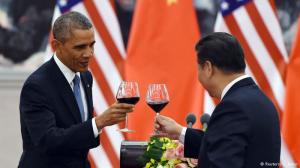
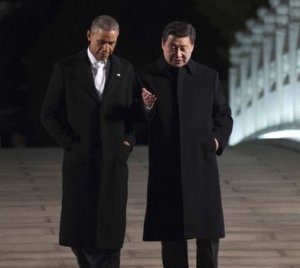
The historic agreement in China between the two largest producers (40%) of global greenhouse emissions elicits surprise at first (with no announcement of a pending agreement before the meeting between Obama and Xi), then produces days of international stories as media, environmental/public interest groups and political forces react.
After the announcement in Beijing and rare, joint press conference, the gathered reporters fed media outlets and tens of thousands of Internet sites. It’s a connected global world…
It seems that the China visit by the US Secretary of State last year pushed the agreement forward.
Here’s the NY Times w/ excellent background reporting by Mark Landler – U.S. and China Reach Climate Accord After Months of Talks
Here’s the Washington Post w/ a continuation of David Nakamura’s on location coverage and context – A tale of U.S.-China contrasts: Obama sounds conciliatory, Xi sounds competitive
Secretary of State John Kerry writes of the agreement’s import – from Think Progress
and the bigger picture from Rolling Stone, where the publication’s banner fits the news – Climate and the fate of the planet
◊
China’s air crisis was a major driver behind the landmark US-China climate deal announced last week – The Atlantic’s James Fallows made this point yesterday, Wednesday, writing that “when children are developing lung cancer, when people in the capital city are on average dying five years too early because of air pollution, when water and agricultural soil and food supplies are increasingly poisoned, a system just won’t last.”
Fallows explains (vid interview) how closely tied China’s environmental crisis is to the fortunes of the Communist Party: On the Politics of China’s Environmental Crisis
◊
All the while, Russia’s Putin was there too and in his meetings another history-making energy deal was announced, this to supply Russian oil/gas to China’s rapidly expanding, and strategically demanding, economy. The recent fall of oil/gas prices, escalating conflict between Russia and the west in Ukraine, Europe and across growing theaters, w/ accompanying trade/banking sanctions, is pushing Putin to shore up his China connection.
A Financial Times/UK headline captures the moment —
Putin builds China links as ties with west fray…
The UK Telegraph zeroes in on an MOU signed in Beijing –
When Vladimir Putin met China’s president Xi Jinping on Sunday, a memorandum of understanding for a second massive gas supply deal caught most of the attention.
◊
Meanwhile the former President of the old Soviet Union, talks of a “new Cold War”
Speaking at a symposium near the Brandenburg Gate yesterday morning, former Soviet president Mikhail Gorbachev warned that the world was “on the brink of a new cold war” and strongly criticised the west for having sown the seeds of the current crisis by mishandling the fallout from the collapse of the iron curtain.
“Instead of building new mechanisms and institutions of European security and pursuing a major demilitarisation of European politics … the west, and particularly the United States, declared victory in the cold war,” said the man behind the Soviet Union’s glasnost and perestroika reforms.
“Euphoria and triumphalism went to the heads of western leaders. Taking advantage of Russia’s weakening and the lack of a counterweight, they claimed monopoly leadership and domination in the world.”
The enlargement of Nato, Kosovo, missile defence plans and wars in the Middle East had led to a “collapse of trust”, said Gorbachev, now 83. “To put it metaphorically, a blister has now turned into a bloody, festering wound.”
Previously an outspoken critic of Vladimir Putin, Gorbachev backed the current Russian president’s stance over Ukraine, urging western leaders to “consider carefully” Putin’s recent remarks at the Valdai forum: “Despite the harshness of his criticism of the west, and of the United States in particular, I see in his speech a desire to find a way to lower tensions and ultimately to build a new basis for partnership.”
◊
The Russia-Insider put a point of inflection on Gorby’s remarks by illustrating the complexity of the Ukraine conflict via a map of predominant languages spoken.
and, in Berlin, a Site Art project marks the Berlin wall on the 25th anniversary of its demolishing, preceding the fall of the Soviet Union. History-in-the-making, east and west…
◊
Continuing w/ art site installations, and reflecting on this past week’s Armistice Day in the US and UK in remembrance of the end of WW1 and, as of 1954 in the US renamed Veteran’s Day, here is a profoundly moving memorial that recalls the famous poem about Flanders fields. The slaughter there is history but the memory remains.
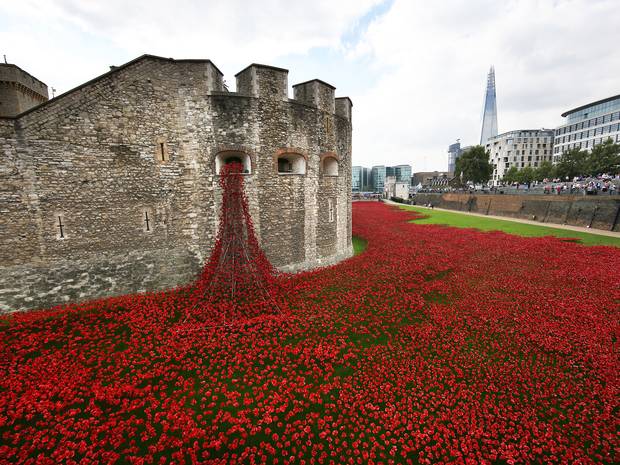
◊
As the British empire bled away, as in the red of the poppies coming from the London crown castle, those who stood against WW1 in the UK are lonely voices in history. D.H. Lawrence, as opposition to his anti-war point of view grew, a “war of machines” and bodies caught up as he wrote, eventually he had to leave his home and the Island kingdom and then in Italy and New Mexico, on an isolated ranch near Taos, he continued to write. Posterity now shows the cost of the war he so vigorously opposed as he attempted to write about sensuality and life. And history, and its lessons, moves on…
◊
Let’s move on to strict religious society, to “red lines” and proverbial negotiating, strategic demands etched as lines that cannot be crossed, in this case, nuclear lines.
Iran’s nuclear negotiators Abbas Araghchi & Majid Takht-Ravanchi meet the Omani Foreign Minister as Oman hosts the final stage of the Iran/P5+1 talks.
November 9, 2014
Evidently a Twitter account serves as a channel of communication of red lines, delivered from Iran’s Supreme Leader Ayatollah Ali Khamenei to the world. It is difficult to understand why or what is intended in this message and accompanying infographic, but here it is…
#Red Lines During the Nuclear Talks
On the same day, Nov 9, Israel announces it will not accept a “deal that leaves Iran a nuclear threshold state.”
The laying out of “red lines” in advance of the Oman round of negotiations contains warnings that can escalate into full-blown war, and tactical nuclear strikes by the US and Israel, as the Iranian nuclear sites, to an extent, are within underground, mountain-covered facilities.
The bellicose threats, from numerous fronts, address the importance of negotiations. The talks could be extended but the “red lines” will have to move if the parties to the talks are to find a diplomatic solution.
◊
Back to the US, and the recent election results.
Voter turnout was the lowest since 1942.
Approximately 4 billion dollars were spent, most in negative campaigning. This comes after six years of a historically obstructive Congress. The political reality in Washington DC and, for the most part across the US, is ‘opposition politics’, attack ads, concerted use of talking points, talk radio as a conduit for political opposition, and resulting dysfunctional government (polling approval of Congress hovering at approx 15%.) Low-voter turnout is one result of negative-focused politics. Another result beyond apathy and dis-engagement is a populace that is distrustful, angry, cynical, the future of the national US interests wavers as positions harden.
Certainly, the recently achieved progress between the US and China on energy production and climate will be tested by the incoming Congressional members who believe that climate change is the “greatest hoax” propagated among many hoaxes.
It should be recalled that over 30% of Americans describe themselves as “independent.” Polls for the past decades in the US regularly point out an increasing share of the electorate (and non-registered citizens eligible to vote) who have opted out of the two-party system. Although US election laws act, unlike most all of the democratic, industrial nations, to limit political races to one of two parties (even as the Libertarian and Green parties have moved to challenge the ‘duopoly’ of US elections), the independent vote continues as a ‘swing vote.’
An independent point of view potentially carries the seeds of a more functional government, as ‘wave elections’ eventually come to be recognized for the frustration of voters (and non-voters) and a desire for more functional, effective government translates to campaign, electoral reform.
We move on…
◊
Again, looking at the Mideast, a very unusual development in Israel that holds potential for re-direction of policy and, with re-direction of policy, an opportunity to see contours of a negotiated peace agreement.
The odds, of course, do not favor peace-makers or peace-making but the fact that war-makers are stepping up to offer peace-proposals carries a message in itself.
106 IDF Ex-Generals, Spy Chiefs Urge New Peace Bid
November 2, 2014
Jewish Daily Forward
In what appears to be the largest-ever joint protest by senior Israeli security personnel, a group of 106 retired generals, Mossad directors and national police commissioners has signed a letter to PM Netanyahu urging him to “initiate a diplomatic process” based on a regional framework. Retired generals have occasionally made joint statements in the past, but never in such numbers and rarely on political matters that aren’t directly related to army business.In what appears to be the largest-ever joint protest by senior Israeli security personnel, a group of 106 retired generals, Mossad directors and national police commissioners has signed a letter to Prime Minister Benjamin Netanyahu urging him to “initiate a diplomatic process” based on a regional framework for peace with the Palestinians.
Several of the signers told Israel’s Mako-Channel 2 News in interviews that Israel had the strength and the means to reach a two-state solution that “doesn’t entail a security risk,” but hadn’t managed to reach an agreement because of “weak leadership.”
“We’re on a steep slope toward an increasingly polarized society and moral decline, due to the need to keep millions of people under occupation on claims that are presented as security-related,” reserve Major General Eyal Ben-Reuven told Mako’s Roni Daniel. “I have no doubt that the prime minister seeks Israel’s welfare, but I think he suffers from some sort of political blindness that drives him to scare himself and us.”
The letter was initiated by a former Armored Corps commander, reserve Major General Amnon Reshef. He told Yediot Ahronot in an interview published Friday, and posted in English today on Yediot’s Ynetnews.com website, that he was “tired of a reality of rounds of fighting every few years instead of a genuine effort to adopt the Saudi initiative.”
He was referring to the Saudi-backed peace proposal that was adopted unanimously by the Arab League in 2002 (here is the full text) and later endorsed 56-0 by the 57-member Organization of Islamic Cooperation, with Iran abstaining. It has since been repeatedly reaffirmed and its terms softened. As currently framed, it offers full peace, diplomatic recognition and “normal relations” between the Arab states and Israel in return for Israeli withdrawal to borders based on the pre-1967 armistice lines, with negotiated land swaps, and a “just” and mutually “agreed” compromise solution to the Palestinian refugee problem.
The generals’ call echoes a proposal for a regional peace conference that was floated during the Gaza war this summer by Israel’s science minister, Yaakov Peri, a member of Yair Lapid’s Yesh Atid party and a former director of the Shin Bet security service. It’s currently being advocated within the security cabinet by Lapid and justice minister Tzipi Livni.
Netanyahu takes the position that Palestinian statehood at this juncture would imperil Israel’s security.
Retired generals have occasionally made joint statements in the past, but never in such numbers and rarely on political matters that aren’t directly related to army business. In January 2012, 52 ex-generals signed a petition calling for legislation to require military or equivalent national service for Haredi men. In November 2011, 19 ex-generals called on IDF chief of staff Benny Gantz to combat growing religious extremism in the army. In February 2010, 15 ex-generals signed a statement criticizing “leftist organizations,” including the New Israel Fund, that they said had damaged the IDF by aiding the Goldstone Report.
The 106 signers of the current letter to Netanyanu include 101 IDF veterans with the rank of brigadier or major general, as well as two former chiefs of the Mossad intelligence agency and three former commanders of Israel’s National Police. (Yediot’s report, which preceded Mako, gave a total of 105.)
The generals’ letter apparently doesn’t refer directly to the Arab Peace Initiative (I haven’t seen the letter’s full text yet), but in calling for a regional process it appears to rely on the willingness of the Saudis and Egyptians to sponsor a conference leading to negotiated peace that renders “the Arab-Israeli conflict ended,” based on the initiative.
The purpose of enlisting the neighboring Arab states is to give the Palestinian leadership backing and legitimacy to accept compromises it has failed to embrace on its own in bilateral talks.
Here are the portions of the letter published by Yediot (translation by Ynetnews):
We, the undersigned, reserve IDF commanders and retired police officers, who have fought in Israel’s military campaigns, know first-hand of the heavy and painful price exacted by wars.
We fought bravely for the country in the hope that our children would live here in peace, but we got a sharp reality check [literal translation: “but reality slapped us in the face” — jjg], and here we are again sending our children out onto the battlefield, watching them don their uniforms and combat vests and go out to fight in Operation Protective Edge…
This is not a question of left or right. What we have here is an alternative option for resolving the conflict that is not based solely on bilateral negotiations with the Palestinians, which have failed time and again… We expect a show of courageous initiative and leadership from you. Lead – and we will stand behind you.
– – – –
http://blogs.forward.com/jj-goldberg/208359/-idf-ex-generals-spy-chiefs-urge-new-peace-bid/
http://www.ynetnews.com/articles/0,7340,L-4586854,00.html
http://www.haaretz.com/news/diplomacy-defense/1.624251
http://www.israelpolicyforum.org/action/100-israeli-generals-call-regional-negotiations
http://www.israelnationalnews.com/News/News.aspx/186988#.VF1GGMnsq3E
http://peacenow.org/issue.php?cat=recommended-readings#.VF1HI8nsq3E
http://www.mako.co.il/news-channel2/Friday-Newscast-q4_2014/Article-71e012015a76941004.htm
◊
From Roger, who selects important stories to follow up —
The Way to World Peace via an Integrated Kantian and Buddhist Perspective
— Kim Them Do
◊
Stars and Stripes
More troops says Commander Dempsey
Air war will intensify says Secretary of Defense Hagel
Priorities?
A study at Princeton University estimates that the U.S. spent $6.8 trillion dollars from 1976 to 2007—three percent of its total GDP—defending oil shipments in the Persian Gulf. If the U.S. government hadn’t spent that money defending Middle Eastern seaways and instead invested far less than the average $225 billion per year at home, we would be oil independent.
◊
While oil politics plays out, costs add up…
Maybe some answers are close at hand, closer than we realize?
Perhaps a little geoengineering – Green rocks?
◊
On that green note, we’ll be back…

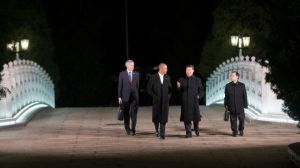
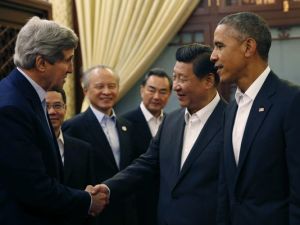
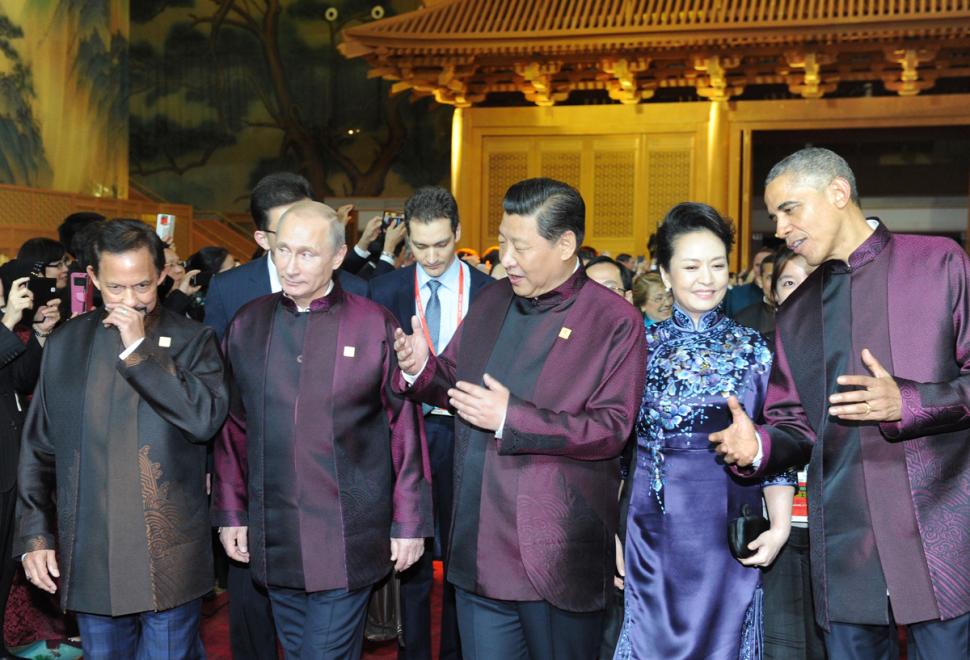

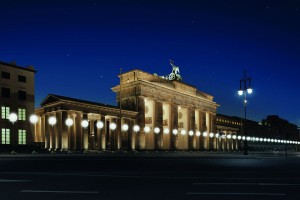
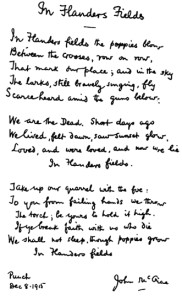



President Nixon once changed the world with a single handshake on a Beijing tarmac, beginning a new relationship with China.
Today, it’s not just our geopolitics that are changing — it’s the earth itself. And it requires a new partnership with China to meet the challenge.
Nothing less than a transformation of the way we use and produce energy will be enough to tackle the urgent threat of climate change.